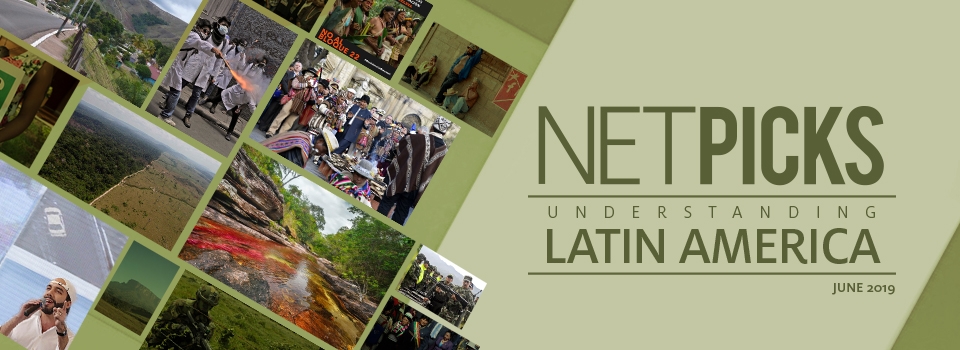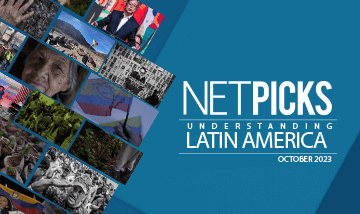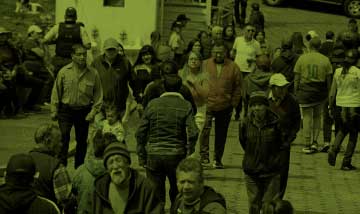
NETPICKS: UNDERSTANDING LATIN AMERICA
Selected food for thought about Latin America. Every month we trawl the web for in-depth analysis, research summaries and opinions we think particularly worth reading, and that you won’t find in the mainstream media.
As part of this month’s offering, you’ll find four articles on: Evo Morales’ pursuit of an unprecedented and controversial third term in Bolivia; the New York Times criticism of the Colombian military’s new orders and the possibility of a new round of ‘false positives’; the need to repair a Colombian environment devastated by war, especially after the withdrawal of the FARC from previously untouched areas; an analysis of the rise of the new President of El Salvador, Nayib Bukele, and the possibilities for change in a county only recently emerging from the shadow of the dirty war of the 1980’s; and finally, a different look at Venezuela, where the Pemon people are fighting to protect their land in the Gran Sabana region, in some cases against the country’s military.
A Testing Year for Bolivia’s Democracy
A Testing Year for Bolivia’s Democracy
On October the 20th of this year Bolivians will go to the polls to elect a President for the next five years. Evo Morales, the actual head of state has overseen dramatic, and positive, social and economic changes in the country; he is once again a candidate despite having lost a referendum aimed at legitimizing his pursuit of an unprecedented third term. Morales won his last election on the first ballot with more than 50% of the vote, but this time his chances are evidently not what they were. Accusations of corruption, the decision to build a road through the Parque Nacional Isiboro-Secure (TIPNIS) added to dubious political maneuvers, have bolstered a mounting if divided opposition, now centered on ex-president Carlos Mesa. A third term is no certainty. https://presidential-power.com/?p=9595&fbclid=IwAR0I_CQHry0r5rcR6RpskpljdLqiaUFvxpVNnU5uGJxdZmY0rkvW5bzdWLk Christopher O’Connell, Presidential Power May 24th 2019
Colombia Army’s New Kill Orders Send Chills Down Ranks
Colombia Army’s New Kill Orders Send Chills Down Ranks
The recent revelations in the New York Times related to an increase in ‘quota’ required of the Colombian Armed Forces in their fight against guerrilla, paramilitary and criminal organizations, has been linked to a possible reappearance of ‘false positives’. While the government and certain sectors of the Military refute the idea, the military sources quoted by the Times have provoked a reaction not only within the country but also in the United States. The author of the piece, the country desk chief, Nicolas Casey, and photographer Federico Ríos were obliged to leave Colombia after their security was threatened after public accusations of Colombian lawmakers. Meanwhile, the New York Times editorial board called on the White House not to support Peace Accord skeptics, in a clear criticism of Colombian president Ivan Duque, who is widely considered to be a front man for ex- President and anti-accord militant, senator Alvaro Uribe. An ‘Independent commission’ has now been appointed to examine the Military’s orders and operational instructions. The army has stated that it will revise the orders ‘to avoid misinterpretation’, but Casey has responded that two of the orders are still worrying. https://www.nytimes.com/2019/05/18/world/americas/colombian-army-killings.html Nicolas Casey. New York Times May 18th 2019
Colombia’s struggle for sustainable development
Colombia’s struggle for sustainable development
The armed conflict in Colombia, principally between a US backed State and the Revolutionary Armed Forces of Colombia (FARC), has left a horrendous legacy: hundreds of thousands dead and millions displaced. The formal end to the conflict has shifted the focus to reparations: how to deal with the people and the environments affected during 50 years of war. Large proportions of the country have been devastated by illegal mining and deforestation, not to mention the drug trade and aerial spraying of Glyphosate. On the other hand, large tracts of land previously controlled by the FARC remained beyond the reach of large scale extraction projects: a type of forced conservation. With the signing of the Peace Accords that has all changed. The challenge now is to the repair the damage, and restrict the destruction of previously inaccessible areas. However, the budgets allocated for the job are far from adequate, while the plans for rural development drawn up as part of the Accords, could also have negative consequences. https://lab.org.uk/colombias-struggle-for-sustainable-development/ Melissa MacEwen. Latin America Bureau (LAB), May 14th 2019
The election of Nayib Bukele in El Salvador shows how wartime polarities have dissolved into pragmatism
The election of Nayib Bukele in El Salvador shows how wartime polarities have dissolved into pragmatism
The election of thirty seven year old Nayib Bukele to the Presidency of El Salvador, a country devastated by a US sponsored dirty war in the nineteen eighties, represented major downturn in the electoral fortunes of both the right and left. The population is evidently tired of political division and is disappointed in the track record of both sides, whose authoritarian policies have not lead to reductions in the scourge of delinquency or to improvements in living standards. The widespread dissatisfaction was made evident the more than 50% of the votes polled by the President elect. The fact that Bukele is also an advertising executive is also significant, leading some observers to suggest a pragmatic, business oriented turn to the country’s political and social direction. Details of Bukele’s plans, their financing, and their means of implementation have been scarce. Whatever Bukele’s policies turn out to be, and despite his popularity, a right wing opposition dominated legislature will represent a major problem. https://blogs.lse.ac.uk/latamcaribbean/2019/05/13/the-election-of-nayib-bukele-in-el-salvador-shows-how-wartime-polarities-have-dissolved-into-pragmatism/ Ainhoa Montoya – LSE Blogs 19 May 2019
The Battle of “The Lost World” in Venezuela’s Gran Sabana
The Battle of “The Lost World” in Venezuela’s Gran Sabana
Almost all the recent news from Venezuela centerss on the political conflict in Caracas between the ‘Chavista’ forces of Nicolas Maduro and the so called ‘democratic’ opposition of Juan Guaidó and Leopold López. But the reality of other areas of the country is also complex and needs to be looked at more closely: the country’s spectacular Gran Sabana region, with its indigenous population, is one of these. The Pemon people, while acknowledging the environmental devastation mining brings to the region, have relied on it to make a living in the absence of other real options. Recently they have been drawn into more violent conflict with the Venezuelan military in order to protect their land from invasion by non Pemon people, and from abuse by the military itself, which has been accused, amongst other things, of extorting the local population. In a recent stand-off with the army two people were killed and six injured, and given the present chaotic environment inthe country as a whole, , the outlook for the Pemon is not positive. https://nacla.org/news/2019/04/22/battle-%E2%80%9C-lost-world%E2%80%9D-venezuela%E2%80%99s-gran-sabana Luis Angosto-Ferrández NACLA, April 22nd, 2019.




